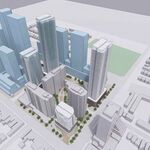From
http://www.movesmartly.com/
August 06, 2008
$298 - Appreciation in Toronto Real Estate for July 2008
John Pasalis in Toronto Real Estate News
Some interesting numbers from the Toronto Real Estate Board this month.
The average sale price for a home in the City of Toronto last month increased by just $298 over the same period last year. The average sale price climbed to $395,342 in July 2008. Prices in the Greater Toronto Area increased by just over one percent from $366,012 last year to $371,427 last month.
The number of homes available for sale in the Greater Toronto Area jumped to 26,543 in July 2008, a 28% increase over the same period last year.
The number of homes sold in the Greater Toronto Area declined by 12% in July 2008 over the same month last year. This is a positive showing given that sales in May and June declined by 19% and 18% respectively.
Here's the press release from Toronto Real Estaet Board this month:
With 7,806 transactions recorded last month, the Greater Toronto Area (GTA) resale housing market continued at a moderate pace in July, Toronto Real Estate Board (TREB) President Maureen O’Neill announced today.
Prices remained stable throughout the GTA in July. At $371,427 the average price increased slightly more than one per cent from $366,012 recorded in July 2007 and nine per cent from the $342,034 figure of two years ago.
In the City of Toronto the average price of $395,342 increased less than one per cent from the July 2007 price of $395,044 and 10 per cent from the July 2006 figure of $360,409.
In the 905 Region the average price increased three per cent to $355,401 compared to the July 2007 figure of $345,967. This also represents an eight per cent increase from the July 2006 average of $329,644.
“Sales declined 12 per cent last month from the best-ever July 2007 record of 8,912 but increased 10 per cent from the 7,082 sales transacted in July 2006,†said Ms. O’Neill. “Comparing July 2007 with July 2006, sales increased by 26 per cent.â€
In the City of Toronto 3,132 sales were recorded, down 14 per cent from July 2007’s 3,640 transactions but up 10 per cent from the 2,852 sales recorded two years ago in 2006. Comparing July 2007 with July 2006, a period before the Land Transfer tax went into effect in Toronto, sales increased 28 per cent.
In the 905 Region there were 4,674 transactions, down 11 per cent from July 2007’s 5,272 sales but up 10 per cent from the 4,230 sales recorded in July 2006. Comparing July 2007 with July 2006, sales increased 25 per cent.
From a year-to-date perspective, the GTA’s 51,249 sales in 2008 have declined 14 per cent from the 59,339 reached at this time a year ago.
Certain neighbourhoods throughout the GTA experienced increased sales activity in July.
In Whitby (E15) sales increased 22 per cent from July 2007, based on strong sales in most housing types.
Brampton East (W24) saw a 12 per cent increase, based primarily on semi-detached home sales.
Strong detached home sales drove Uxbridge (N16) to a 23 per cent increase compared to a year ago.
The Annex (C02) experienced a 29 per cent sales increase due to strong detached home and condominium apartment sales.
In addition to stable prices, the list to sale price ratio, at 98 per cent, remains unchanged from a year ago.
“While homeowners continue to see healthy returns, it is taking slightly longer to achieve a sale; the average time on market has increased to 33 days compared to 31 days a year ago,†said Ms. O’Neill. “This may be due to that fact that there is now more choice available to homebuyers; there are currently 26,543 active listings, a 28 per cent increase from a year ago.â€
http://realosophy.typepad.com/MarketWatch/July2008.pdf



